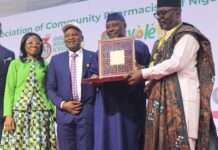Availability of forex to pharmaceutical manufacturers is pivotal to their operations and relevance, especially as the country prepares to launch into the African Continental Free Trade Agreement (AFCFTA). In this exclusive interview, the Managing Director of Bioraj Pharmaceuticals Limited, Pharm. Beyioku Rahman, disclosed the implications of Nigeria going into the AFCFTA, without a stable forex system. He also frowns at the manner in which the CBN COVID-19 intervention fund was delayed before being disbursed to companies, saying many manufacturers did not benefit from it. He equaally charges pharmacists, especially those in hospital and administrative practice, to live up to expectations in the discharge of their duties. Temitope Obayendo was with him at Ilorin, Kwara State.

Tell us a little about yourself.
I’m Pharm. Beyioku Rahman, a Fellow of the Pharmaceutical Society of Nigeria (PSN). I graduated in 1987, worked for about four years and started my own business in 1994, as a retail outlet in Kebbi State. In 2006, I started my own manufacturing outfit, which is where we are today. I am also the chairman of Manufacturers Association of Nigeria (MAN), Kwara/Kogi.
COVID-19 affected all sectors of the economy, especially pharmaceutical manufacturers. Can you share with us how Bioraj weathered the storm, though the pandemic is still with us?
By the way, you know that manufacturing in Nigeria is not too conducive because of an array of challenges that are involved. The list of problems facing manufacturers in Nigeria is inexhaustible, including lack of infrastructures, erratic power supply, multiple taxation and others. But, by and large, all the manufacturers have been trying to cope.
Relating it to the COVID era, which was a global thing, how everyone coped was related to how much help they got from the government of their countries. I know in other climes like the US and the UK, their government rose to assist their people, but it is another thing entirely here. A lot of problems actually arose then and even the government was not spared, as it was struggling with finance and how to make forex available to its people.
Concerning us in Bioraj Pharma, we have maintained our operations and our staff. We have not closed down for one day, except for public holidays, but that does not signify the absence of problems.
CBN released an intervention fund for pharma manufacturers and many companies have reportedly accessed it. Was Bioraj fortunate enough to access the fund to boost its opertions?
Well the intervention fund came with some conditions. Firstly, its 5 per cent interest rate was increased to 9 per cent by March 2021 and before anybody could apply, six months was already gone. Again, nine months was already gone down the line before disbursement was made. A lot of noise was actually made about this fund – although the CBN said it released money, a lot of companies did not get it. Nationally, I’m aware not many companies benefited from it. We did not apply, since the interest rate was going to increase to 9 per cent. I rather stayed with BOI.
As the chairman of MAN Kwara/Kogi, what is your reaction to government on this delayed access of loan to your members?
This is not the first time such a thing is happening; it came up during the tenure of Late Prof. Dora Akunyili. Then, there was a promise of intervention to manufacturers to upgrade their facilities, but we never got it. Now that we are going into this African Continental Free Trade Agreement (AFCFTA), it means that the whole African continent is becoming one market, and Nigerian companies will have to compete with their counterparts from Egypt, Kenya, Algeria and others. That means we must be able to compete in terms of quality and price. If all these problems of infrastructure persist, it will be very difficult to compete favourably.
By the time the AFCFTA takes off fully, we might be surprised that an Egyptian company will establish a depot in Idumota or Ilorin, and get all the distributors to himself, as Africa becomes a single market. If government does the right thing, we have a lot of things to gain from it because Nigeria has about I.3 billion customers, which is a very big market.
A lot of inter-African trade will come, but before we can benefit from that, government has a lot of preparations to make – especially this forex problem. Nigeria’s currency has tumbled from N190 to over N500 to a dollar , while CFA has remained the same, as well as Ghana Cedis, which has been very stable for the past years. The question is, what happened to Nigeria’s currency? This has made it so difficult for companies to project their transactions.
Although the CBN has taken some steps by removing the bureau de change operators, but even removing them does not end the problem. Government needs to force the banks to sell forex to their customers; they need to enforce that area of selling it to customers.
On the part of MAN, what steps have been taken to address this challenge?
MAN has embarked on a lot of advocacy on the issue of forex, especially at the headquarters. We’ve had dialogues with the CBN governor, who has made a lot of promises and all the stakeholders have been involved. But the bottom line is that the operation of FX is a little awkward because it is only in Nigeria where you have several rates. You have the bank rates, CBN rate, wholesale rate, inflow rate and bureau de change rate. This creates a lot of rooms for manipulations. When it was N308, the same CBN allowed some people to sell at N345; it also allowed bureau de change another rate.
Going forward, how can these issues be resolved?
Political will – people at the helms of affairs must be ready to step on the toes of economy saboteurs. We just talked about BDC, people making millions without offices. This must stop as the CBN has declared. All middlemen must be removed; I think we will get there. Again, government must have a road map on how to make the environment conducive for manufacturers; that is, the ease of doing business in the country. Presently, we have a haphazard arrangement of road networks. There must be a systemic way for government to arrive at ease of doing business in Nigeria.
Members of Association of Hospital and Administrative Pharmacists of Nigeria just concluded their 22nd Annual National Scientific Conference in your domain, here in Ilorin. What is your message to the delegates?
It is a nice thing that Kwara hosted the conference, and delegates should endeavour to practicalise what they have learnt at the conference. It is a good development that government is favourable to that area of practice, with the consultancy cadre approval. My message to all pharmacists in this group is that they need to have the tools and knowledge to face other healthcare professionals in the hospital to proof that pharmacists are the custodian of drugs.
They must train and retrain themselves in order to convince doctors and nurses that they are well up to the task; that pharmacists are the real custodians of drugs. It will be wrong for a doctor to mention a particular drug and the pharmacist cannot tell the pharmacokinetics and the rest information involved in the formation of the drug.
But if doctors and other health professionals know that you have the proper knowledge of the drug, they will accord you the right respect. I’m saying this because hospital practice is the next window to the world after community practice. Whatever we do within that system portrays the image of Pharmacy outside the pharmacy profession. So hospital and administrative pharmacy practice should be that which portrays the pharmacy profession in good light.
As a manufacturer located in this part of the country, how have you been coping with the challenges of faking, adulteration of products, etc?
We have taken steps to forestall the issue of adulteration and faking, by ensuring we make our logo and trademarks not easy to copy. Also, we have selected printers working for us, because this is another opening through which fakers explore, as some printers can just copy your artwork and give to anybody. In terms of market, we are doing well in the whole country, except the northeast that we have not been able to penetrate for some obvious reasons, but we are doing well in other areas.













